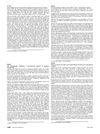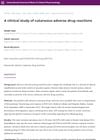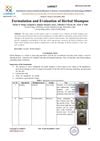 4 citations,
January 1974 in “The BMJ”
4 citations,
January 1974 in “The BMJ” All medications can cause skin rashes, often without a clear cause, and better tests are needed to identify these drug-related skin issues.
 3 citations,
April 2016 in “Journal of The American Academy of Dermatology”
3 citations,
April 2016 in “Journal of The American Academy of Dermatology” A woman had a severe skin reaction from the drug imiquimod, used for skin cancer, highlighting the need for awareness of rare but serious side effects.
 3 citations,
May 2014 in “Journal of The American Academy of Dermatology”
3 citations,
May 2014 in “Journal of The American Academy of Dermatology” Dermatologists greatly affect inpatient diagnosis and treatment of skin conditions, especially in spotting infections in patients with weakened immune systems.
 2 citations,
October 2016
2 citations,
October 2016 Chemotherapy and radiotherapy can cause skin side effects like rashes, hair loss, and nail changes, which are usually managed with conservative treatments.
2 citations,
November 2013 Topoisomerase inhibitors can cause hair loss, skin rash, hand-foot syndrome, and nail changes.
 May 2024 in “CRC Press eBooks”
May 2024 in “CRC Press eBooks” Children's hair loss can have various causes, including infections, autoimmune issues, physical stress, nutritional problems, and genetic factors.
 April 2024 in “DAHUDER Medical journal”
April 2024 in “DAHUDER Medical journal” The study concluded that there is no significant link between thyroid autoimmunity and alopecia areata.

Modern skin cancer treatments can cause skin side effects and hair loss, affecting patients' quality of life.
June 2021 in “BIOMED natural and applied science” Chemotherapy targets all dividing cells, causing side effects like nausea and hair loss.
 January 2021 in “Springer eBooks”
January 2021 in “Springer eBooks” Different rheumatological diseases can cause specific skin problems.
June 2020 in “Faculty Opinions – Post-Publication Peer Review of the Biomedical Literature” Researchers found a specific T cell receptor linked to severe drug reactions like Stevens-Johnson syndrome when patients take carbamazepine.
 May 2017 in “InTech eBooks”
May 2017 in “InTech eBooks” Early treatment of children's hair loss, which can be caused by various factors, is important due to its emotional impact.
 March 2017 in “International journal of basic and clinical pharmacology”
March 2017 in “International journal of basic and clinical pharmacology” Skin reactions to drugs are most often rashes caused by antibiotics, with nevirapine being the most common culprit; knowing these patterns can improve treatment and outcomes.
 October 2005 in “CRC Press eBooks”
October 2005 in “CRC Press eBooks” Telogen effluvium is a condition where hair falls out due to various factors like illness, stress, or nutrient deficiency.
 January 1987 in “Side effects of drugs annual”
January 1987 in “Side effects of drugs annual” Some cosmetics and dermatological drugs can cause allergic reactions and side effects, like skin irritation and systemic issues.
 21 citations,
July 2017 in “Journal of Cosmetic and Laser Therapy”
21 citations,
July 2017 in “Journal of Cosmetic and Laser Therapy” Vesicular carriers like liposomes may improve cosmetic skin treatment delivery and effectiveness but need more human research.
 11 citations,
January 2023 in “BioMed Research International”
11 citations,
January 2023 in “BioMed Research International” Microbial biosurfactants could be a safer and environmentally friendly alternative to chemical surfactants in cosmetics.
 December 2023 in “International Journal of Biological Macromolecules”
December 2023 in “International Journal of Biological Macromolecules” Chitosan nanoparticles loaded with Minoxidil were effective for hair growth but released the drug more slowly than the amphiphilic derivative.
 December 2023 in “International Journal of Advanced Research in Science, Communication and Technology”
December 2023 in “International Journal of Advanced Research in Science, Communication and Technology” Herbal shampoo is safe, effective, and good for hair and scalp health.
12 citations,
December 1951 in “Experimental Biology and Medicine” Liver in the diet reduces cortisone acetate toxicity effects in rats.
1 citations,
January 2015 A compound from Aloe barbadensis Miller can help regrow hair better than minoxidil.
 January 1988 in “Reactions (Auckland)”
January 1988 in “Reactions (Auckland)” A woman developed a severe skin reaction from the antibiotic cefalexin.
13 citations,
July 2017 in “Annals of Oncology” Chemotherapy toxicity might be reduced by using DNA neutralizing agents.
 1 citations,
June 2021 in “General physiology and biophysics”
1 citations,
June 2021 in “General physiology and biophysics” Minoxidil relaxes rat blood vessels mainly through nitric oxide and potassium channels.
January 2022 in “Clinical Cases in Dermatology” Chemotherapy can cause significant but usually reversible hair loss, and managing it involves patient education and hair care strategies.
 10 citations,
March 2015 in “American journal of primatology”
10 citations,
March 2015 in “American journal of primatology” Ingesting Leucaena leucocephala caused hair loss and increased infant mortality in ringtailed lemurs.
 January 2023 in “Л.Н. Гумилев атындағы Еуразия ұлттық университетінің хабаршысы”
January 2023 in “Л.Н. Гумилев атындағы Еуразия ұлттық университетінің хабаршысы” Botulinum toxin is effectively used to treat various painful conditions and its therapeutic uses are growing.
 17 citations,
January 2019 in “Journal of cancer”
17 citations,
January 2019 in “Journal of cancer” The formula YH0618 can reduce the harmful side effects of the chemotherapy drug Doxorubicin and protect healthy cells.
52 citations,
February 2003 in “Archives of dermatology” 9-cis-retinoic acid showed some effectiveness in treating AIDS-related Kaposi sarcoma but had significant side effects at higher doses.
 48 citations,
July 1996 in “Human & Experimental Toxicology”
48 citations,
July 1996 in “Human & Experimental Toxicology” Human enzymes can detoxify harmful substances but might also increase their cancer risk.






















